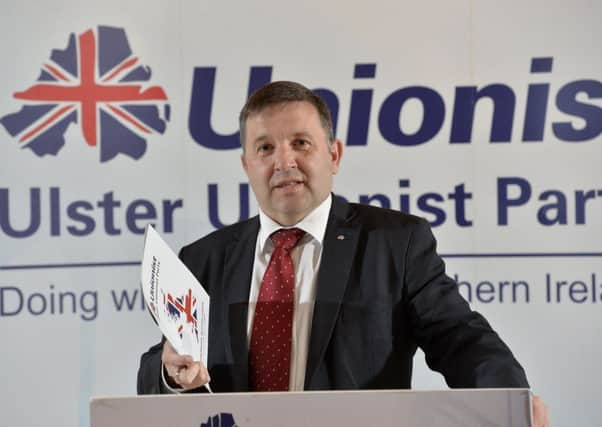UUP indicate that they would not back Corbyn in hung Parliament


In the last Parliament the UUP had two MPs and the DUP had eight – a bloc which was larger than the Liberal Democrats’ eight MPs.
On Thursday new UUP leader Robin Swann launched his party’s manifesto – which is just a handful of pages long – at an event in Templepatrick, in the heart of the bellwether unionist seat of South Antrim.
Advertisement
Hide AdAdvertisement
Hide AdThe UUP’s Danny Kinahan took the seat from the DUP in 2015 but by a margin of just 1,000 votes. But in March’s Assembly election, the DUP had a lead of almost 5,500 votes over its smaller unionist rival, making it a seat which both parties are keenly fighting to win.
The News Letter asked Mr Swann if he could categorically state – as the DUP has done – what his MPs would do in the event of a hung Parliament.
The North Antrim MLA said: “I’m not so sure that there’s going to be a hung Parliament but our MPs will fight for Northern Ireland at every opportunity – I’m not going to make any commitments at this stage if there’s a possibility of supporting a government or not.”
When asked if that meant that he was not ruling out supporting Jeremy Corbyn, Mr Swann then did appear to do just that, saying: “Look, [I’ve] been very clear in the past in relation to Jeremy Corbyn and his stances on the past that I would not see him as a potential for Prime Minister.”
Advertisement
Hide AdAdvertisement
Hide AdThat provoked loud applause and cries of “hear, hear” from Ulster Unionist candidates and members in the room.
The Ulster Unionist Party historically shared close ties with the Conservatives until 1985 – although some of its members have always been left of centre – and it briefly resurrected the Tory link between 2008 and 2010.
The DUP has already made clear it will support Theresa May if its support is necessary for her to form a government.
Mr Swann also dismissed as “nonsense” Sinn Fein and now SDLP calls for a border poll. The UUP leader said that he did not fear the outcome of such a referendum but that once triggered, the terms of the Good Friday Agreement allow for a border poll as frequently as every seven years, something which Mr Swann said would “sectarianise every election in Northern Ireland”.
Advertisement
Hide AdAdvertisement
Hide AdIn his speech on Thursday, Mr Swann argued that “there has been a revitalisation of unionism across the United Kingdom. It is no longer a Northern Ireland-centric viewpoint with those who recognise the clear benefits becoming increasingly vocal in England, Scotland and Wales.”
‘No to second EU referendum’
On Brexit – which the UUP opposed – Mr Swann said that the “days of Remainers and Brexiteers are over” and that the UK would now leave the EU “as one nation”.
Accusing Sinn Fein of a “hypocritical” stance on EU “to exploit this situation for their own ideology”, he said: “They remained almost silent during the EU referendum, and yet they claim they are the most opposed to Brexit. In reality Sinn Fein has never had a consistent message on EU membership. Only last February the party was claiming that ‘the economic and fiscal policies of the European Union have had catastrophic effects on the lives of many of its citizens’.”
Referring to calls by the Alliance Party and others for a second referendum on the final Brexit deal, Mr Swann said: “Calls by some for a second referendum following negotiations are a thinly veiled attempt to reverse the decision taken by the people of the United Kingdom in the referendum last year.”
Advertisement
Hide AdAdvertisement
Hide AdMr Swann said that such a proposal would also weaken the UK’s negotiating hand with the EU.
He asked: “Why would the EU attempt to negotiate fair terms with the UK if they thought that there was any possibility of a second referendum happening?”